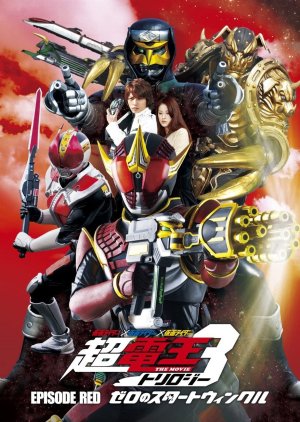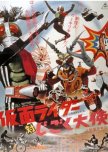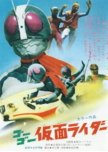
The only thing I didn't particularly enjoy about the three films is that I thought they were interconnect a little bit--but they are really completely separate from each other. On one hand that's a nice quality for watching them... but on the other, it was called a "trilogy", but really it was just three films released in tandem in the same storyverse.
I would definitely recommend this series to people who enjoyed Den-O.
Cet avis était-il utile?

Cette critique peut contenir des spoilers
Wasted potential for a Yuto epilogue, temper your expectations.
*copied from my LB review*Yuto's somewhat convoluted but nonetheless tender and tragic story thread from Den-O was always one of its stronger qualities - of a young man from the past heading to the present to stop abnormalities and save his future with the woman he loves. The Den-O series proper ends with a melancholic yet somewhat open finale of Yuto moving on to await his potential future with Airi while leaving the present (iirc). It was a story ripe for a more conclusive affirmation of their love to blossom in a way, and so knowing of this coda series of Den-O films and hoping for a more focused, involved send off for Yuto, I was very much looking forward to this story.
Sadly, this doesn't totally deliver.
On paper, it starts off promising: Yuto contrives a way to be able to look like a hero in front of Airi and find an excuse to be able to encounter her again, but afterwards when they go to talk, Airi tells him that the Sakurai from the future that she fell in love with is now erased, as a fate which isn't set in stone, and that the (Yuto) Sakurai of Airi's affections was an altruistic, self-sacrificing person, who gave up his existence to protect her, but he exists now as a bygone memory (a fated future becoming a discarded past). She remarks to current Yuto that his fixation on Airi and their destiny is bound in that past fate, and now that it is no longer inevitable, and Airi's understanding of the future Yuto is now gone, she believes current Yuto can't live up to that standard, and that he should move on from her.
It suggests a major dialogue of star-crossed lovers being afforded other choices, open to a myriad of other, potentially better possibilities, and an emotionally investing story of Yuto wanting to still try and believe his love for Airi is true and that she will reciprocate him again, a sort of aching existential romance with a lot of potential.
Instead we get a few passing comments from Airi, followed by a bunch of drawn out, hollow silences with angsty gestures and maudlin soundtrack accompaniment, thinking the initial basis of romantic conflict alone with a lot of posturing looks of longing and sadness at nothing is enough to sustain it when a much more rigorous dialogue and focus on these 2 would be required to really make it work.
And thus, we get a lot of the usual Den-O antics, still focusing too much on Ryotaro and the Taros, and it seems especially weird that Airi probably at some point just passively accepted that the younger version of Ryotaro is just *a thing* now, and he and the Taros just get up to a bunch of directionless stuff about trying to find out why the DenLiner is acting up and stuck within one month bouncing around or whatever and some villain conspiring to kidnap Airi and everything. There's nothing wrong with having those guys there, they are more of the main characters after all, and the more typically Den-O plot shenanigans would necessitate their involvement more anyways, but they just take up way too much of the focus with their schtick and undermining the pathos inherent to the real story here. It was a bit of a strange juxtaposition of tones in the series, but that had the luxury of being a 49 episode TV series able to juggle a bunch of different beats and tonalities, here, it is really intrusive.
Yuto should be the main character of this film, but he feels cursory to Ryotaro and the gang, as he doesn't even directly defeat the villain of this film, they do. He just saves Airi from being kidnapped in some van and then goes to look at the stars and drives off with her while she tenderly puts her arms around Yuto as he drives and he puts his hand on hers, meant to count as a romantic resolution. Even Ura remarks that love requires more than just the heroic savior gesture to blossom, to which the film's idea of "more" to fulfill that is just those small things aforementioned.
And what of the villain of the film? Even just a proper antagonist for a potential love triangle to wedge between Airi and Yuto to drive the conflict, not even strictly malicious, maybe someone who is some charming lover that Yuto has to compete with? No, instead we get some homeless guy who just saw Airi pass by him once and then made a contract with an Imagin to be able to just whisk her off her feet by having the Imagin threaten to attack and kidnap her, meant to parallel Yuto's first act of course, but more dubious is all. While that parallel could further illustrate Yuto's own failings and how he has to change, again, the ending provides little of substance for a meaningful growth in him and a real, thorough dialogue with Airi, in its own way it contrives an ACTUAL new threat for Yuto to literally just swoop in and be the hero and that being almost the end of it, it is incredibly cheap and shallow.
Again, one of Den-O has some strange qualities which are offset by the fun, energetic vibes, eclectic cast and how it is able to juggle and flesh out so much because of its length as a TV series, and Den-O has never had good major villains really, but in more limited formats like individual films, they have to be more focused and emphasized, a good villain really enriches the drama to make stories more interesting after all, but here, Yuto's sad sidestory is now (meant to be) the core throughline which is expressly threatened by the central villain of the piece, but the villain is a pathetic nothing, so that just makes the drama here flounder more, it doesn't really work.
This gets by on Den-O's pre-existing charms like most good Rider series keep their supplementary material afloat in a similar vein, but this is a massive disappointment and continues to prove how frustratingly inessential extra Den-O content is more and more over time. Kobayashi has one more Den-O movie after this to maybe prove otherwise (plus the Yellow film not written by her) but so far everything Den-O related after Climax Deka has continued to be a letdown.
Cet avis était-il utile?











![Kaiju,Tokusatsu,Mecha,etc* [Multi-List]](https://i.mydramalist.com/aEgymt.jpg)
![Kaiju,Tokusatsu,Mecha,etc* [Multi-List]](https://i.mydramalist.com/Zbd0q_4t.jpg)
![Kaiju,Tokusatsu,Mecha,etc* [Multi-List]](https://i.mydramalist.com/YAZ2gt.jpg)
![Kaiju,Tokusatsu,Mecha,etc* [Multi-List]](https://i.mydramalist.com/9xYJyt.jpg)
![Kaiju,Tokusatsu,Mecha,etc* [Multi-List]](https://i.mydramalist.com/xbjEr_4t.jpg)




















